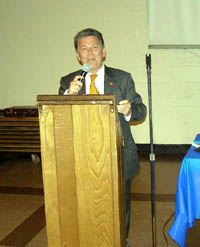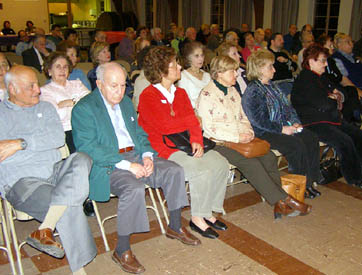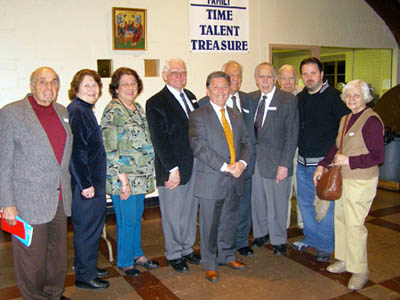 |
|
|
|
|
|
Solon Society Held Unique Lecture on |
|
| “I am Greek” (EIMAI ELLHNAS), said Dr. Gaetano Cipolla, professor of Italian at St. John’s University in Queens, New York. A new perspective on the Greeks Overseas and their relationship with Sicily was the theme of this unique lecture. The event was sponsored by the Solon Society at St. Paul’s Greek Orthodox, 110 Cathedral Avenue, Hempstead, New York. |
|
| “There is no one like Dr. Cipolla,” said Andreas George, writer and Master of Ceremonies. “I heard him speak at the Pan Macedonian House a year ago to a packed audience. He is one of the leading authorities in the world on Sicily. His book ‘Sicilian Studies of the Sicilian Ethos’ contains chapters on the Greek, Jewish and Arabic presence and their influences on Sicilians.” “Sixteen different foreign invasions of Sicily took place,” said Dr. Cipolla. “The invaders were attracted by the fertility and beauty of the landscape. I do not view the Greeks as invaders. There is no separation between Sicily and Greece. Sicily was Greece. The Greek heritage is seen everywhere. Greece changed the landscape of Sicily forever.” |
 Dr. Gaetano Cipolla explaining his views. |
| “Sailors talked about a lush island that sparked Greek imagination,” he explained. “The Greeks considered the island a promised land. Once they established themselves as Sicilians, they outdid their brothers in the grandeur of their achievements, Naxos was the first settlement founded by the Chalcidians of Euboea in 735 B.C. Other cities followed: Siracusa by Corinth in 734 B.C.; Catania in 727; Messina in 689 B.C.; Gela in 688 B.C.; Agrigento in 580 B.C. and other settlements. All the primary cities were founded on the coast. The Greek cities eventually succeeded in hellenizing the island completely, establishing a flourishing civilization in their cities.” Dr. Cipolla firmly asserted that “as the Greeks put their mark on the island, Sicily, as it was to do with almost every domination, conditioned and shaped that culture in its own image. The Greeks of the Diaspora, Siculi and Sicans came to be known as Siceliots using a Greek suffix ‘otu’ still in use in Sicilian meaning ‘belonging to’. The Greeks had no future in their homeland, that was bursting with a population explosion and little space The colonization was more than immigration.” |
|
“The Greeks were not invaders who came and conquered,” he affirmed. ‘They came in search of land to cultivate in ‘the island of the sun’ as Homer called it. They came to stay beginning as Greek Sicilians, then Siciliotes and finally as Sicilians. They spoke Greek up to the 11th century. Syracuse became the dominant world power of that time after the defeat of the Athenian navy during the Peloponnesian War. The conquest of Sicily by Rome marked the end of the most glorious period in Sicilian history. The glory Sicily had under the Greeks 2000 years ago was the highpoint of their history.” I thought I was listening to a lecture on “The Greeks of the Diaspora” given by the Greek Education Ministry. |
 A packed audience attends the lecture. |
|
“Currently, America is mesmerized by the movie, “300” based on Leonidas and the three hundred Spartans at Thermopylae. Dr. Cipolla said “Spartan soldiers came to Sicily as part of an expeditionary force. Their shield had the Greek letter ‘Lambda’ that stood for Lacedemoni”, their ancient name. The l (l) resembles a human leg. After the Spartans settled, the shield decoration was changed to three legs, so they would be recognized as belonging to Sicily, known to the Greeks as Trinacria (three cornered island), The three running legs with the image of Demeter, Mother Earth Goddess, in the center is now on the Sicilian regional flag.” Who would think the ancient Spartans influenced life in Sicily? The St. John’s University professor remarked that the great minds of antiquity were born and lived on Sicilian soil. They included: Archimedes; Gorgia of Lentini, a founder of Greek philosophical thought; Empedocles, father of Philosophy; Epicharmus, father of comedy; Charondas, Catania lawgiver; Sesicorus of Himera, a poet and others. “It was not a one way street,” he asserted. “Many Sicilians returned to Greece to visit the oracles, participate in the Olympic games, to teach and to learn. Sicily was Greece on a grander scale. Sicily received the language culture and institutions of the Greeks and later contributed to the mother country and the world. Sicily and Southern Italy became known as “Magna Graecia” and deserves some of the credit.” “Goethe said ‘Sicily is the key to understanding not only Italy, but Greece,’” he contends. “The European intellectuals came to Sicily to discover Greece. One can not think of Greece without Magna Graecia. It is like returning home. Come and visit us.” That is how I felt when I went on an Arba Sicula tour with Dr. Cipolla. The Solon Society’s outstanding lecture presented a down to earth, humble intellectual who showed us the truth of Sicily: a place to rediscover our Greek roots. The official website is http://arbasicula.org. For more information on the Solon Society, e-mail dsmiros@optonline.net . |
|
 Dr. Gaetano Cipolla (center) with Solon society members. |
|
|
(Posting date 03 April 2007) HCS encourages readers to view other articles and releases in our permanent, extensive archives at the URL http://www.helleniccomserve.com/contents.html, especially fine articles penned by Dr. Catherine Tsounis and press releases about the Modern Greek Studies program at St. John's University, where she is an adjunct professor, at the URL http://www.helleniccomserve.com/archivetsounis.html. For more information about Professor Tsounis, see her biographical sketch at http://www.helleniccomserve.com/biotsouniscatherine.html |
|
|
|
|
2000 © Hellenic Communication Service, L.L.C. All Rights Reserved.
http://www.HellenicComServe.com |
|
